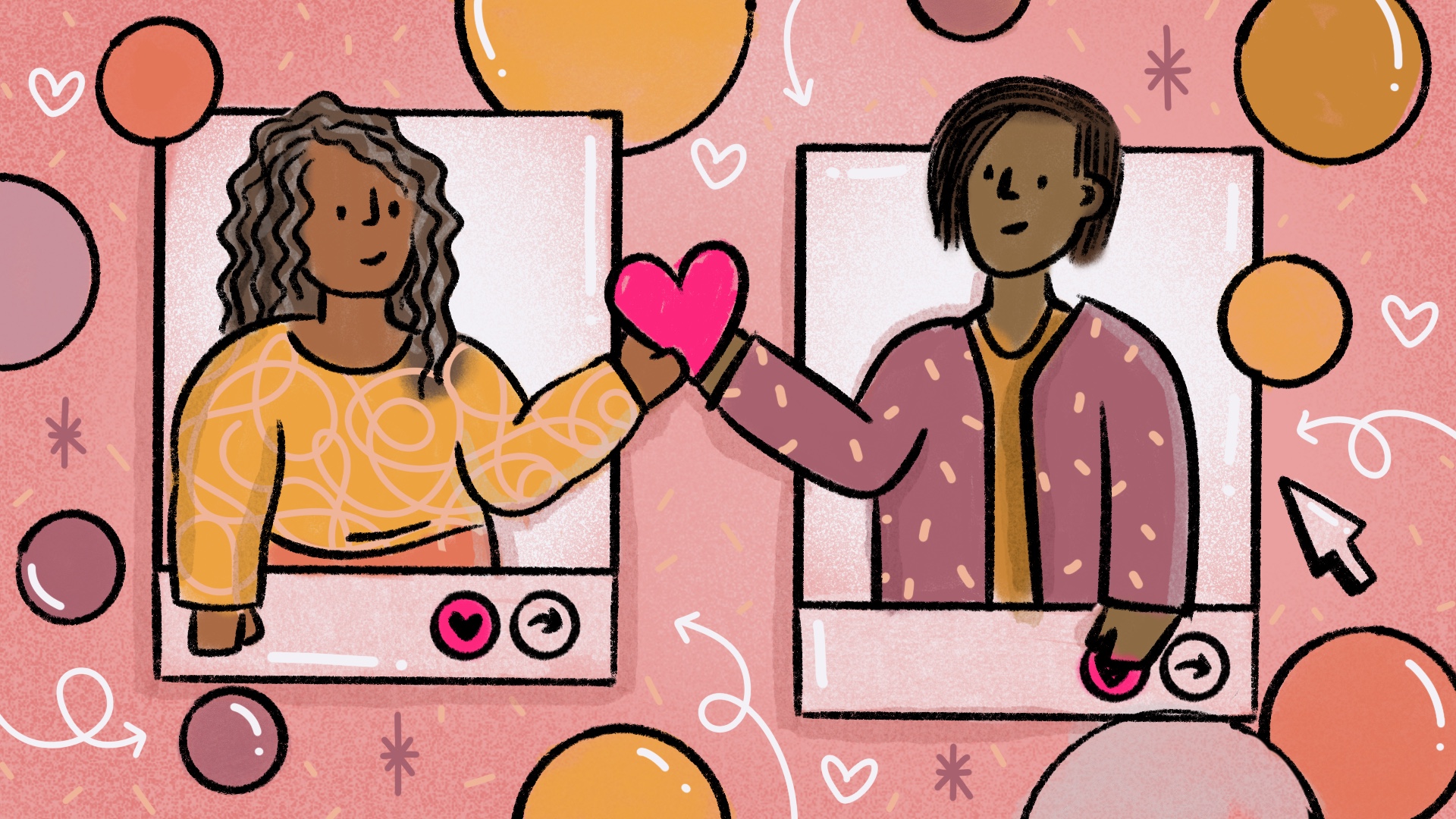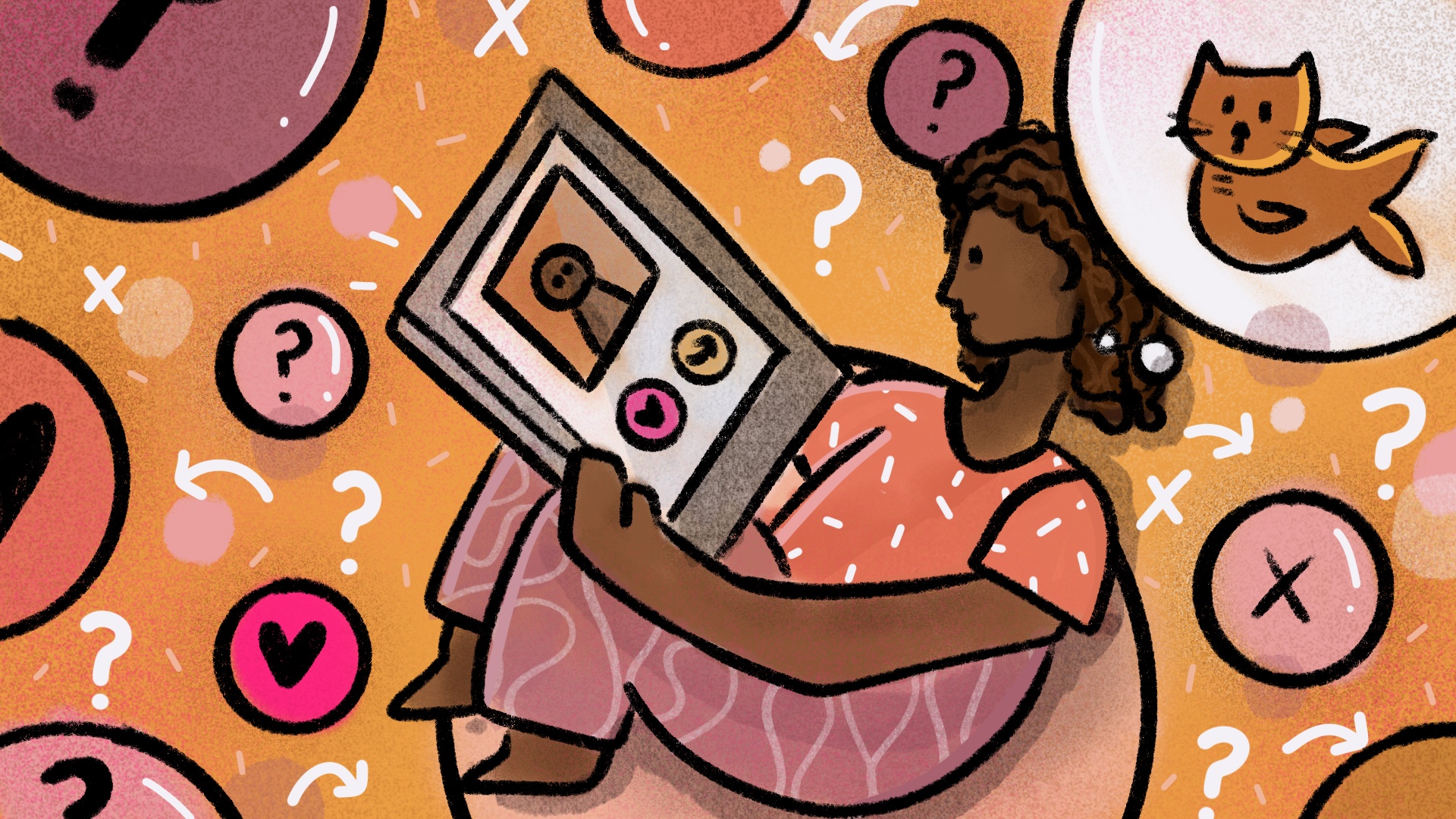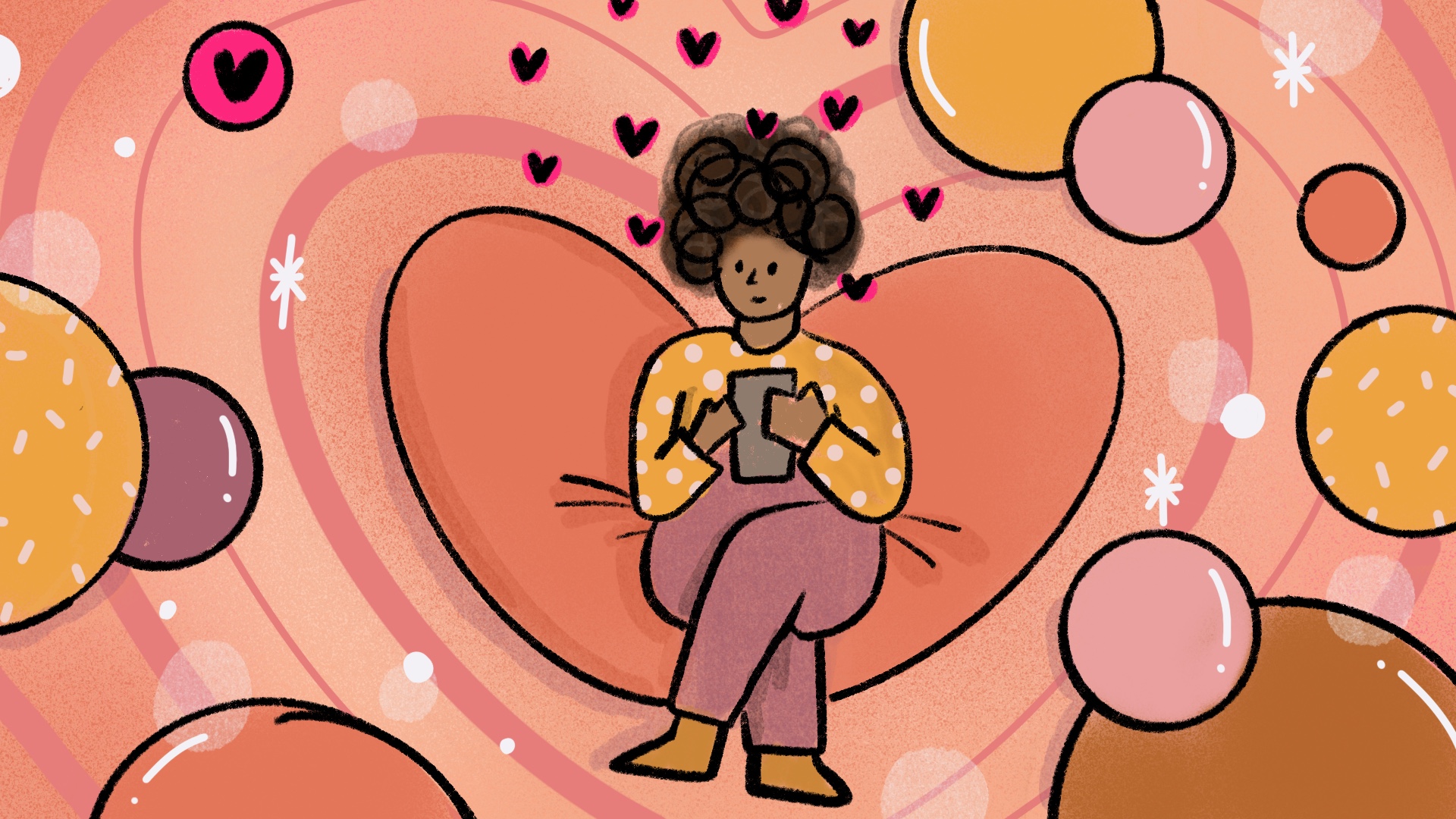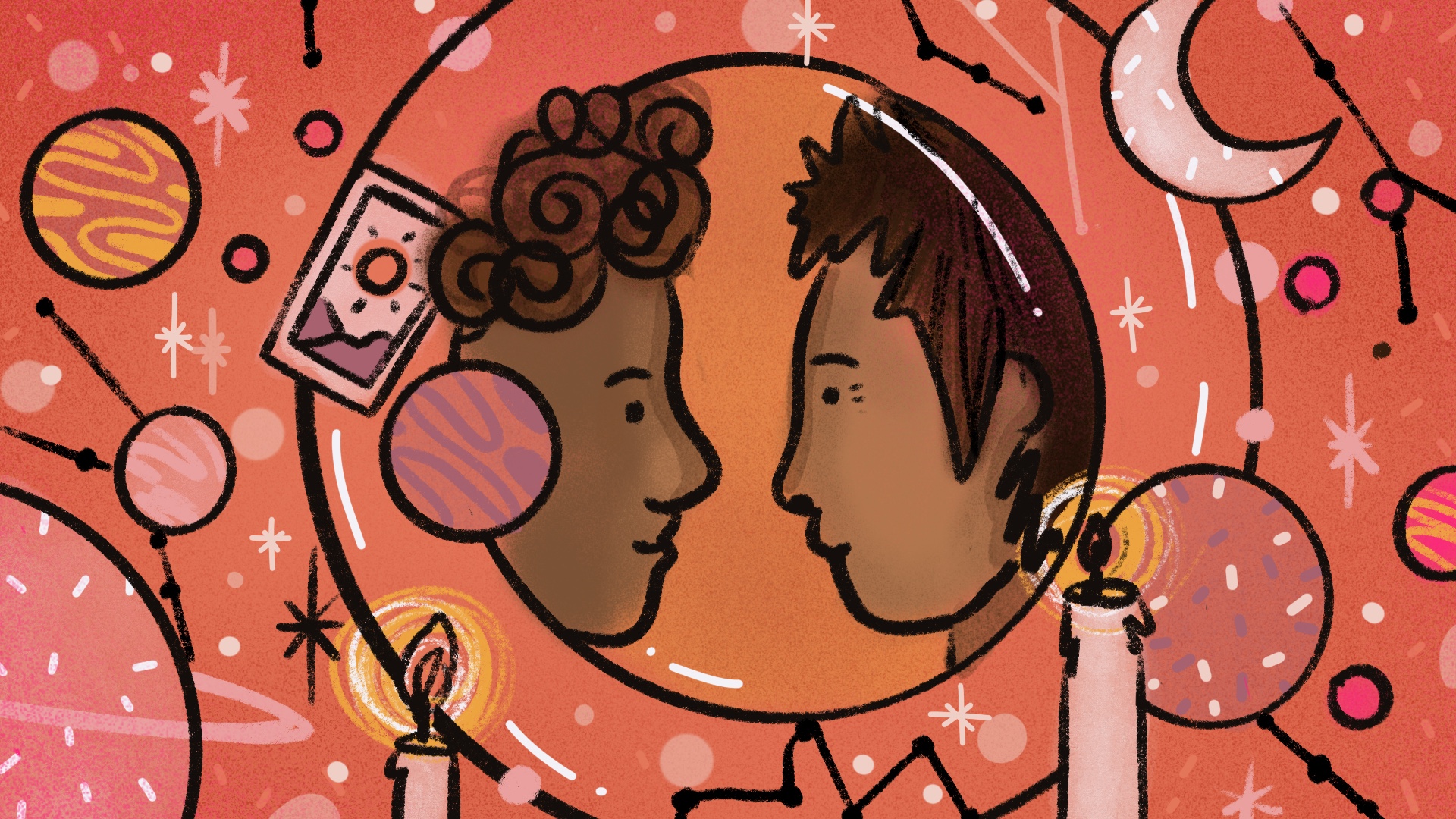
Artwork by Soofiya
Self-love, community and joyful connections — when dating apps aren’t just for dating
In partnership with Tinder, gal-dem explores how apps can help people with marginalised identities find love of all kinds – not just the purely romantic.
Katie Goh
25 Mar 2022
In partnership with Tinder.
“There’s this Filipino word, kilig, that describes the feeling of having a crush and getting to know someone and that specific vibe for when every small thing is so emotionally charged,” explains 21-year-old student, Jo*. “It’s like that hand-grab moment in Pride and Prejudice. I missed having that buzz with people, so that was really the impetus for me getting on dating apps.”
The early kilig-esque thrills of dating – a notification alert, the first suggestion to meet up in person, a conversation about a shared love for a musician – is what brings many of us to first download a dating app. However, matching with strangers through apps can also lead to more unusual, less categorisable connections: one-off spontaneous hangouts that leave an impact, a friend for life or an experience that reaffirms someone’s sense of self. Particularly, for people with marginalised identities, apps can be a lifeline for making friends, building communities and feeling less alone.
“Particularly, for people with marginalised identities, apps can be a lifeline for making friends, building communities and feeling less alone”
A surprising, impactful connection was what Jo soon discovered after signing up to a dating app. “I matched with someone who I then saw in my queer studies seminar. They messaged me after that class asking if it was me from the app. From then on we had something in common and started hanging out. We began doing student organising together and volunteered to be part of a group that occupied a building during the university strikes. We ended up sitting in that building at night during the occupation watching a French silent film. Nothing ever happened between us and we’re still friends now, but it would have been such a cute origin story if a relationship had happened!”
Similarly, for Rhona*, who is also 21, dating apps opened up a new world of connections, as well as a community of people of colour, when she began university in Glasgow. “After high school I was desperate to get on dating apps and was especially excited to meet girls on apps because there hadn’t been a lot of queer dating in my very suburban, very white and middle-class school,” she explains. “The idea of someone at school seeing my profile gave me the ick, so moving away from the high school bubble was a big moment for me. Glasgow is overwhelmingly white, but going on apps, I could see people of colour in Glasgow who I didn’t recognise. A lot of my close friends now are people of colour I met on apps who I ended up crossing paths with later down the line.”
Even though Rhona doesn’t always go on in-person dates with everyone she matches with on apps, she has used them as a guide to queer dating in real life. “I didn’t actually start going on dates for a while, but I would often bump into someone at a club who I’d already matched with, and maybe chatted to, but the conversation had fizzled out online. It was more using apps as a way of acknowledging that mutual attraction could be there if I saw them around.”
Jo has also found that dating apps can remove the often anxiety-inducing ambiguity of queer dating. “I think especially if you’re looking for a non-heteronormative relationship, it takes a lot of the uncertainty out,” they say. “Apps can present people who you already know but, in this online space, you’re connecting with a specific understanding.”
“I think especially if you’re looking for a non-heteronormative relationship, it takes a lot of the uncertainty out”
Jo
For 23-year-old Kat* dating apps helped them rethink the boundaries that are drawn in society between different kinds of relationships. “At uni I used dating apps a lot and sometimes would match with someone and think, I just want to talk to you and hang out,” they explain. “I met quite a few of my friends through them and I’m grateful for what those connections taught me about relationships in general. I think there’s a strong line drawn in today’s society about platonic and romantic relationships, and I think that very much speaks to how we view the hierarchy of relationships. But I think there’s so much overlap between platonic and romantic relationships and now, I think I want more platonic-ness from romantic relationships. Those two things are so intertwined, which is something I figured out through using dating apps.”
Although Kat is frank that their experience on apps hasn’t been wholly positive – “there are very few trans people of colour on apps which can be a lonely experience,” they say – the experience of using them has had a profound impact on their perception of their own identity. “When I was queer, but didn’t really know what that meant, I was talking to a trans girl on an app. We clicked on so many things and talked so much rubbish about movies and strange facts, and although nothing ever came of it, it was a euphoric experience for me. At that time, I was trying to figure out my identity and it really excited me that I was connecting on a level that I never had on dating apps with this person. That experience made me feel like I could be attracted to who I felt attracted to, not who I was being told to feel attracted to.”
“That experience made me feel like I could be attracted to who I felt attracted to, not who I was being told to feel attracted to”
Kat
Rhona has also had some less than perfect experiences on apps, but through them has similarly developed a strong sense of boundaries when it comes to dating. “I remember in 2020 when Black Lives Matter protests were happening, people would use that as a way to start a conversation with me,” she says. “Maybe if it was an in-person date, I could forgive it, but in the concentrated space of a dating app, I realised that was not okay. I’ve figured out what I’m comfortable with and what I’m not comfortable with, which has been really good for me and what I want out of dating.”
Dating apps have also given Jo a newfound confidence about the relationships they want in life, whether romantic, platonic or otherwise. “It’s made me know what I want more and it’s made me feel more at peace about the ways I connect with people. Not every encounter, whether with a friend or in a work setting or on a dating app, has to be so high stakes. It’s a profound lesson I’ve learned through apps: that people are just people!”
*Names have been changed to protect identities.



